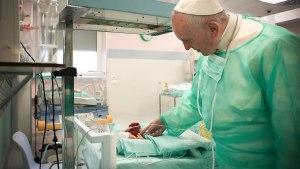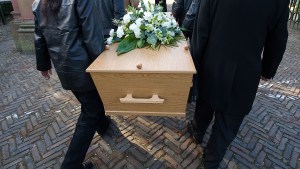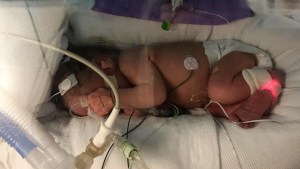On Tuesday, the Vatican’s council for doctrinal matters, the Congregation for the Doctrine of the Faith, announced the publication of a Letter approved by Pope Francis on June 25, titled Samaritanus bonus (“The Good Samaritan”): On the Care of Persons in the Critical and Terminal Phases of Life.”
It’s dated July 14, in honor of St. Camillus de Lellis, the patron saint of the sick, hospitals, nurses, and physicians.
“Incurable cannot mean that care has come at an end” – those who are terminally ill have the right to be welcomed, cured, loved. This is affirmed in Part One of Samaritanus bonus.
The Letter aims to provide concrete ways to put into practice the parable of the Good Samaritan, who teaches us that “even when a cure is unlikely or impossible,” medical care, nursing care, psychological and spiritual care “should never be forsaken.”

Read more:
Pope thanks nurses: You are among the ‘saints next door’
Incurable, never ‘un-care-able’
“To cure if possible, always to care”[1]. These words of Pope Saint John Paul II explain that incurable is never synonymous with un-care-able. To provide care until the very end; to “be with” the sick person; to accompany, listen to, make him or her feel loved: this is how loneliness and isolation, the fear of suffering and death can be avoided. The entire document is focused on the meaning of pain and suffering in the light of the Gospel and of Jesus’ sacrifice.
“The uninfringeable value of life is a fundamental principle of the natural moral law and an essential foundation of the legal order,” the Letter states. “We cannot directly choose to take the life of another, even if they request it.”
Citing Gaudium et spes, the document reiterates that “abortion, euthanasia and wilful self-destruction poison human society” and “are a supreme dishonor to the Creator” (no. 27).

Read more:
RIP: Cardinal who gave JPII last rites and his left hand (What a story!)
Obstacles that obscure the sacred value of human life
The document cites several factors that limit the ability of apprehending the value of life, such as when life is considered “worthwhile” only if certain psychic and physical conditions are present. One of these obstacles the Letter notes is a false understanding of “compassion.”
True compassion, it explains, “consists not in causing death,” but in affectionately welcoming and supporting the person who is sick, and providing the means to alleviate his or her suffering. Another obstacle it lists is a growing individualism that provokes loneliness.

Read more:
Does the Church expect us to suffer instead of “dying with dignity”?
It is a definitive teaching that euthanasia represents “a crime against human life,” and, therefore, is “intrinsically evil” in every circumstance.
Any “formal or immediate material cooperation” constitutes a grave sin against human life that no authority can “legitimately recommend or permit.” Those who approve laws in favor of euthanasia “become accomplices” and are “guilty of scandal” because these laws contribute to the malformation of consciences. The act of euthanasia must always be rejected.
However, the Letter acknowledges that the desperation or anguish of the person requesting it might diminish or even make “non-existent” his or her personal responsibility.
No to aggressive treatments
The document also explains that protecting the dignity of death means excluding aggressive medical treatments. Therefore, when death is imminent and inevitable, “it is lawful … to renounce treatments that provide only a precarious or painful extension of life,” without, however, interrupting necessary ordinary treatments the patient requires, such as food and hydration “as long as the body can benefit from them.”
Palliative care is a “precious and crucial instrument” with which to accompany the patient. Palliative care must never include the possibility of euthanasia, the Letter emphasizes, but should include the spiritual assistance of both the person who is sick and the members of their families.

Read more:
A Christian’s guide to decisions about death
It is important in caring for a sick person that he or she is not made to feel like a burden, but that they “sense the intimacy and support of their loved ones. The family needs help and adequate resources to fulfill this mission.”
State governments need to “recognize the family’s primary, fundamental and irreplaceable social function (…) [and] should undertake to provide the necessary resources and structures to support it.”
Care in the prenatal and pediatric stages
From the moment of conception, children affected by malformation or other chronic illnesses are to be accompanied in a “manner respectful of life.”
In cases of “prenatal pathologies… that will surely end in death within a short period of time,” and when no treatment exists to improve the child’s condition, the child “should not be left without assistance, but must be accompanied like any other patient until they reach natural death,” without suspending food and hydration.
The Letter states that “recourse to prenatal diagnosis” is “obsessive” in today’s society and notes that it sometimes results in the choice for abortion or other “selective purposes.” Both abortion and the use “prenatal diagnosis for selective purposes” are “unlawful,” the Letter asserts.

Read more:
The doctor advised the parents to “terminate,” but they chose prayer instead
To alleviate pain, medication is used that may “induce the loss of consciousness.” The Letter affirms that it is morally licit to sedate “to ensure that the end of life arrives with the greatest possible peace and in the best internal conditions.” This also applies to types of sedation that hasten “the moment of death (deep palliative sedation in the terminal stage).”
But it is not acceptable that sedation be administered that “directly and intentionally causes death,” something the Letter defines as a “euthanistic practice”.
The ‘vegetative’ state
Even in the case when the patient is not conscious, he or she “must be acknowledged in their intrinsic value and assisted with suitable care,” which includes the right to food and hydration. There may, however, be cases in which “such measures can become disproportionate” because they are no longer effective or because the means of administering them “create an excessive burden.”
In this case, the Letter states that “adequate support must be provided to the families who bear the burden of long-term care for persons in these states.”
Conscientious objection
The Letter requests that locals Churches and Catholic institutions and communities “adopt a clear and unified position to safeguard the right of conscientious objection” in contexts where morally grave practices are allowed by law. It also invites Catholic institutions and healthcare personnel to witness to the values the Church professes regarding life issues.
Specifically in the case of practices of euthanasia, the document states that “there is a grave and clear obligation to oppose them by conscientious objection.”
It is important that doctors and healthcare workers be formed in accompanying the dying in a Christian way. The spiritual accompaniment of a person who chooses to be euthanized requires that of “an invitation to conversion,” and never any gesture “that could be interpreted as approval,” such as remaining present while the euthanasia is being performed.

Read more:
Boston priests form team to administer sacrament to COVID-19 patients
[1] John Paul II, Address to the Participants in the International Congress on “Life-Sustaining Treatments and Vegetative State: Scientific Advances and Ethical Dilemmas”.
